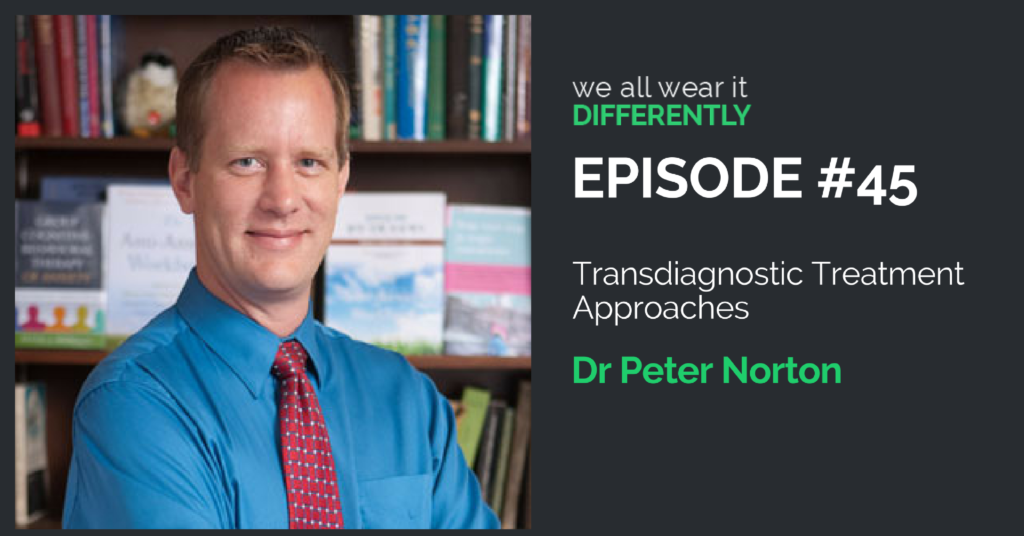#45 – Transdiagnostic Approaches with Dr Peter Norton

Professor Peter Norton is an expert in Transdiagnostic Approaches to mental health treatment. He received his PhD in Clinical Psychology in 2003 at the University of Nebraska-Lincoln after completing his predoctoral residency at the University of British Columbia Hospital. He joined the faculty of the Department of Psychology at the University of Houston as an Assistant Professor that same year, and was promoted to Associate Professor with Tenure in 2008, and Professor in 2013. Previously, he received a B.A. (Psychology and Sport Sciences) from the University of Winnipeg, an M.Sc. (Sport Psychology) from the University of Western Australia, and an M.A. (Clinical Psychology) from the University of Nebraska-Lincoln. He is currently appointed as Professor within the School of Psychological Sciences, Monash University (2013-current).
An internationally recognized expert in the study and cognitive-behavioural treatment of anxiety disorders, Professor Norton has authored nearly 100 research studies; has delivered many presentations and workshops for the scientific community, therapists, and the general public; and sits on the editorial board of two scientific journals. Dr. Norton is the coauthor of The Anti-Anxiety Workbook: Proven Strategies to Overcome Worry, Phobias, Panic, and Obsessions, a best-selling self-help guide for overcoming anxiety disorders, and Group Cognitive Behavioural Therapy of Anxiety: A Transdiagnostic Treatment Manual.. Dr. Norton has also received early career awards and research grants from the U.S. National Institute of Mental Health, U.S. National Institute for Drug Abuse, University of Nebraska-Lincoln, University of Houston, Anxiety Disorders Association of America, and American Psychological Association, for his work on studying and treating anxiety.
His research explores transdiagnostic and diagnosis-specific factors across anxiety and other emotional disorders, and translates these factors into efficacious and efficient interventions. This work involves a combination of basic and experimental research to better understand common and unique aspects of affective psychopathology, and clinical outcomes research to develop and evaluate new or modified interventions to target these core features. As a result of this research, Dr. Norton was awarded the 2009 Theodore Blau Early Career Award for for Outstanding Contribution to Professional Clinical Psychology from the American Psychological Association Society for Clinical Psychology. Dr. Norton’s lab has also been focused on understanding how race, ethnicity, and culture shape the presentation, experience, and treatment of anxiety disorders.
Recommended Resources
Trainings and Presentations
- Workshop/keynote at the APS College of Clinical Psychologists meeting in Brisbane (coming up in a few weeks) – 30th June 2017
- Keynote – “Transdiagnostic Approaches to the Cognitive Behavioural Treatment of Anxiety and Emotional Disorders” at Australian Association of Cognitive Behavioural Therapy (AACBT) 38th National Conference. 26 Oct 2017 – 28 Oct 2017, Sydney.
- Professor Norton is planning local Melbourne training workshops on a variety of clinical topics via Monash University in the near future so stay tuned!
Books
- Martin, A & Norton, P. (2009). The Anti-Anxiety Workbook: Proven Strategies to Overcome Worry, Phobias, Panic, and Obsessions, a best-selling self-help guide for overcoming anxiety disorders.
- Norton, P. (2012). Group Cognitive Behavioural Therapy of Anxiety: A Transdiagnostic Treatment Manual.
Papers
Peter's Self-Care Tip
- Create and maintain boundaries between your work life and personal life. Peter says it's easy for his work life as an academic and professor, and his work life as a clinician to encroach on is personal life. He reminds himself to maintain boundaries by thinking “I am Peter, not just an academic, not just a clinician..”
- When Peter's out of balance he says there are a number of cues that will let him know. It might be a word from his wife, or his dog's ecstatic energy (in other words begging for some attention!).
Feedback
Please leave Dr Peter Norton or myself a comment or some feedback, we’d love to hear from you and I’ll respond to everyone!
- # 63 – Paediatric Chronic Pain with Dr Nicki Ferencz - November 13, 2020
- # 64 – Chronic Pain with Sports and Exercise Psychologist Damien Stewart - November 11, 2020
- # 62 – Pain Management with Dr Jacqui Stanford - November 8, 2020

Hi Amy,
I am loving your podcast, have been listening to the episodes for a while now and find your interviews fantastic and so educational. It inspires me to go the shownotes and follow up with my own reading. Thank you, Katherine.
Hey Amy,
Thank you for this podcast. It was very informative and gave a wide overview of some of the current issues in clinical psychology – def will help for my upcoming exam!
Fantastic podcast.
I Have written a review and distributed it among peers – I think they will all benefit.
Thank you Amy